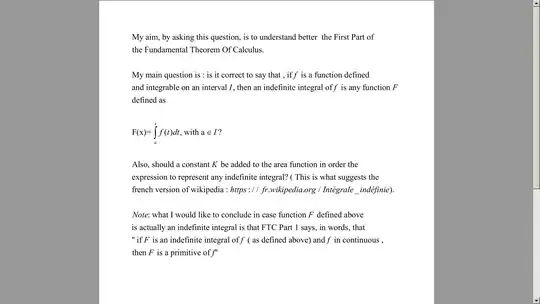With a view at undertstanding better the FTC Part 1 , I ask this question about the definition of " indefinite integral"
-
6So... you have written a question as text, then taken a picture of it, then posted the picture?? Why not copy-and-paste the question text itself? – Feb 11 '20 at 18:47
-
The FTC (as I know it) applies only to continuous functions. – Torsten Schoeneberg Feb 12 '20 at 01:28
-
1@TorstenSchoeneberg: FTC is available for discontinuous functions also, but the formulation is much simpler if the function being integrated is continuous. – Paramanand Singh Feb 14 '20 at 10:27
1 Answers
You need to understand the meanings of "primitive", "indefinite integral", and "definite integral" (or more properly Riemann integral).
Let $f:[a, b] \to\mathbb {R} $ be a function. A primitive of $f$ is another function $F:[a, b] \to\mathbb {R} $ such that $F'(x) =f(x) $ for all $x\in[a, b] $. Anti-derivative is synonymous with primitive.
Not every function possesses a primitive. However it is guaranteed via Fundamental theorem of calculus that continuous functions possess primitives. Two primitives of same function differ by a constant (this is a consequence of mean value theorem). Further the primitive of an elementary function need not be an elementary function.
Indefinite integral of $f$ represents the class of all primitives of $f$ (and as noted in last paragraph all of these differ by a constant). This is generally denoted by $\int f(x) \, dx$ and in general it is evaluated in the form $F(x) +C$ where $F$ is a primitive of $f$.
The definite integral or Riemann integral is another related and complicated beast. And moreover this is the central and more important idea in integral calculus. Primitive or indefinite integral is only a tool used to evaluate definite integral under certain circumstances. You should see the definition of Riemann integral in this answer.
Now let's come back to your question. If $f:[a, b] \to\mathbb {R} $ is a Riemann integrable function and $F:[a, b] \to\mathbb {R} $ defined by $$F(x) =\int_{a} ^{x} f(t) \, dt$$ then $F$ is a related function which may or may not be the primitive of $f$. In fact it may happen that $f$ does not possess an anti-derivative / primitive. However FTC ensures that if $f$ is continuous on $[a, b] $ then the above function $F$ is a primitive of $f$ and we have $$\int f(x) \, dx=F(x) +C$$ You should observe that theory of integrals and related objects is much simpler if the function being integrated is continuous.
- 87,309
